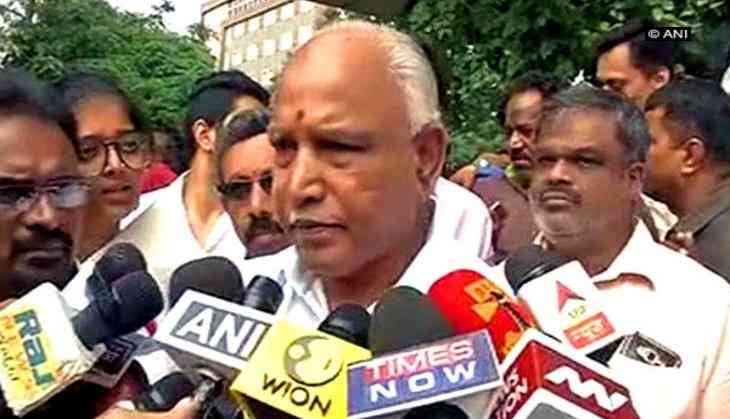Why the fall of Yeddyurappa's 2-day govt means much more than just loss of face for BJP

The Bharatiya Janata Party (BJP) Saturday got a bitter dose of its own medicine plus an additionally bitter shot with the fall of its two-day-old government in Karnataka. BS Yeddyurappa's resignation even before the floor test is likely to be remembered as one of the most embarrassing moments in the party's history.
If previous developments in Goa and Manipur had established BJP chief Amit Shah as the master of electoral intrigue, the imbroglio in Karnataka has snatched away that credential from him.
Not only has the BJP been forced to sit out of power in spite of emerging as the single-largest party, its state as well as central leadership has been left red-faced. The party brazenly deployed all underhand tricks a democratic power-play has room for and yet failed miserably.
In the process, it also ended up sullying the high Constitutional office of the Governor and the humbling process of government formation itself. The spectacle of Congress MLAs rumoured to have been 'poached' trooping into the Assembly and voting for the JD(S)-Congress alliance was a sight to behold.
An eventful day
The day began with the Supreme Court rejecting the Congress party's appeal to remove KG Bopaiah as the pro-tem speaker. However, the apex court allowed the floor test to be telecast live, in order to ensure full transparency.
Then emerged rumours of BJP having succeeded in poaching at least 2-3 Congress MLAs. Congress accused mining barons Reddy brothers of having kidnapped these MLAs at a hotel. Since the Supreme Court had ordered the DGP to ensure the protection of all MLAs before the trust vote, he personally went to the hotel later to check on these remours.
Minutes later, these very MLAs appeared in the Assembly, with Congress' Vokkaliga strongman DK Shivakumar in tow. The implication was clear – if any attempt had indeed been made to poach them, it had failed. The BJP's failure to cobble up the numbers it was boasting about became clear within minutes, as Yeddyurappa started presenting what seemed like a farewell speech in the Assembly.
His addressed was interspersed with several bursts of crying, as he tried to convince that the only objective behind all the manoeuvrings he and his party indulged in was to serve the farmers of the state.
My only aim to form the govt in Karnataka was to help the poor and farmers and waive off their loans: BS Yeddyurappa | #KarnatakaFloorTest#LIVE Updates: https://t.co/4qyC6glpJ7 pic.twitter.com/Fijs8zEZaC
— News18 (@CNNnews18) May 19, 2018
Promising to serve the people of the state in power or in the Opposition, Yeddyurappa announced his resignation from the CM's position, even before facing the floor test. Commentators were quick to recall former prime minister Atal Bihari Vajpayee's similar resignation in the Lok Sabha in 1996 that he too was forced to tender before facing the floor test.
The major difference, however, behind the two situations is that Vajpayee, in his speech, had steadfastly refused to resort to the manipulations that the BJP carried out in Karnataka.
The key to success
The BJP's failure to form the government in Karnataka will come as a big boost for the morale of Congress workers across the country. Getting used to seeing their party lose to an ever-expanding BJP even where the latter did not have the numbers, Congress workers will now be able to hope that with the right strategy, their party can still win elections.
The Congress's hard-fought victory was the result of a successful three-pronged strategy. While senior leaders of the party lost no time in reaching out to JD(S) for a post-poll alliance on the latter's terms, its legal team snatched power from the BJP's jaws, getting the SC to curtail the 15-day window given by the Governor to the BJP to just one.
The third part of the strategy, and the most crucial one, was to do everything possible to keep its flock intact. With strongmen like Shivakumar watching over and with critical help from the ruling TRS in Hyderabad, where all Congress MLAs were sent for a day, the Congress succeeded remarkably in this task.
Implications for the future
The roller-coaster developments in Karnataka have given two indications. First is that the Congress is finding its mojo back. The party made a quick move for an unconditional post-poll alliance, that woo with a rival, even after not getting the numbers. In the process, it learned the importance of allowing strong regional parties to take the lead.
The Congress then launched and saw to the end a successful legal battle, not allowing any move by the BJP to go unchallenged.
Both these strategies showed that four years after facing decimation at hands of the BJP in the Lok Sabha polls, the Congress party is regaining the stomach for a fight.
More crucial, however, was the first display of opposition unity in the anti-BJP camp after the Bihar elections of 2015. A number of opposition leaders had critical roles to play in the entire saga. BSP chief Mayawati not just got her lone MLA in the state to support the Congress-JD(S) combine, she also spoke to JD(S) chief H D Devegowda to urge him to make the alliance happen.
Trinamool Congress chief Mamata Banerjee also spoke to the former PM to make the same appeal. CPI(M) also expressed support, with Congress thinking about packing off its MLAs to a resort in Kochi at one point of time.
Neighbouring CMs Chandrababu Naidu and K Chandrashekhar Rao also extended support to this campaign, promising to provide protection to the Congress flock in their respective states.
If this sentiment can be further worked upon, a Grand Alliance to give the BJP a run for its money in 2019 could be easier to stitch-up than previously thought. From that perspective, the floor-test saga in Karnataka could become a watershed moment.
First published: 19 May 2018, 20:58 IST

